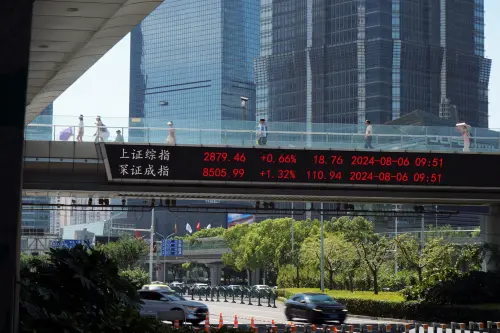Global investors are increasingly re-evaluating mainland China's stock markets after two years on the sidelines, which bankers believe will drive renewed market activity, as equity issuance doubled in the first quarter compared to the same period last year.
Easing government scrutiny of technology companies and the emergence of disruptive AI software developer DeepSeek serve as attractive draws for overseas investors, even amid concerns over Sino-U.S. trade tensions.
Total equity issuance from Chinese firms in the first quarter reached $16.8 billion, representing a 119% increase year-over-year.
"The psychology of investors has changed. Many who previously believed China was not investable now think this is a re-rating process," said James Wang, head of Asia ex-Japan Equity Capital Markets at Goldman Sachs. "While there is still risk recognition, it has shifted towards searching for opportunities, particularly among long-only investors."
In Hong Kong, the benchmark Hang Seng Index has risen 21% this year, making it the best performer among international markets. On a 12-month basis, the index trades at a price-to-earnings ratio of 10.5.
The MSCI China index has a 12-month P/E ratio of 11.7, compared to 20.3 for the MSCI U.S. and 20.5 for the S&P 500. Indian markets average between 18 and 19.99.
"The world's second-largest economy is offering global investors stock valuations that are 40% lower than those in other markets," Wang noted.
Micro policies from the Chinese government and the success of DeepSeek have clarified the perceived value of Chinese stocks, highlighting the valuation gap and providing downside support for investors.
There has been a notable shift in the tech sector dynamics. A recent meeting led by President Xi Jinping with top tech leaders was widely interpreted as a signal that the stringent government scrutiny introduced in 2020 is relaxing.
In January, DeepSeek captured global attention by launching AI products at significantly lower prices than major competitors. The government has since signaled a readiness to increasingly support private enterprises, particularly in technology.
"The emergence of DeepSeek has prompted a fundamental shift in global investors' perspectives on China and the government's approach to AI and quantum computing," said Harish Raman, Citigroup's Asia head of ECM execution and solutions. "This development is encouraging and fosters support for Chinese private companies, especially those in AI, quantum tech, semiconductors, and microelectronics."
Chinese companies also elevated the value of initial public offerings (IPOs) in Hong Kong to $1.47 billion in the first quarter, up from $612.7 million a year earlier.
As the year progresses, most major listings in Hong Kong are expected to be secondary listings of mainland Chinese firms seeking to raise capital in the financial hub. Battery maker CATL, listed in Shenzhen, has filed for a Hong Kong listing expected to raise at least $5 billion.
"With strong support from both mainland Chinese and Hong Kong regulators, and encouragement for more high-end A-share companies to list in Hong Kong amid uncertainties in the U.S. and European markets, the recent surge in trading activity in the Hong Kong securities market is likely to be sustainable," said MinterEllison consultant Victoria Lloyd.
